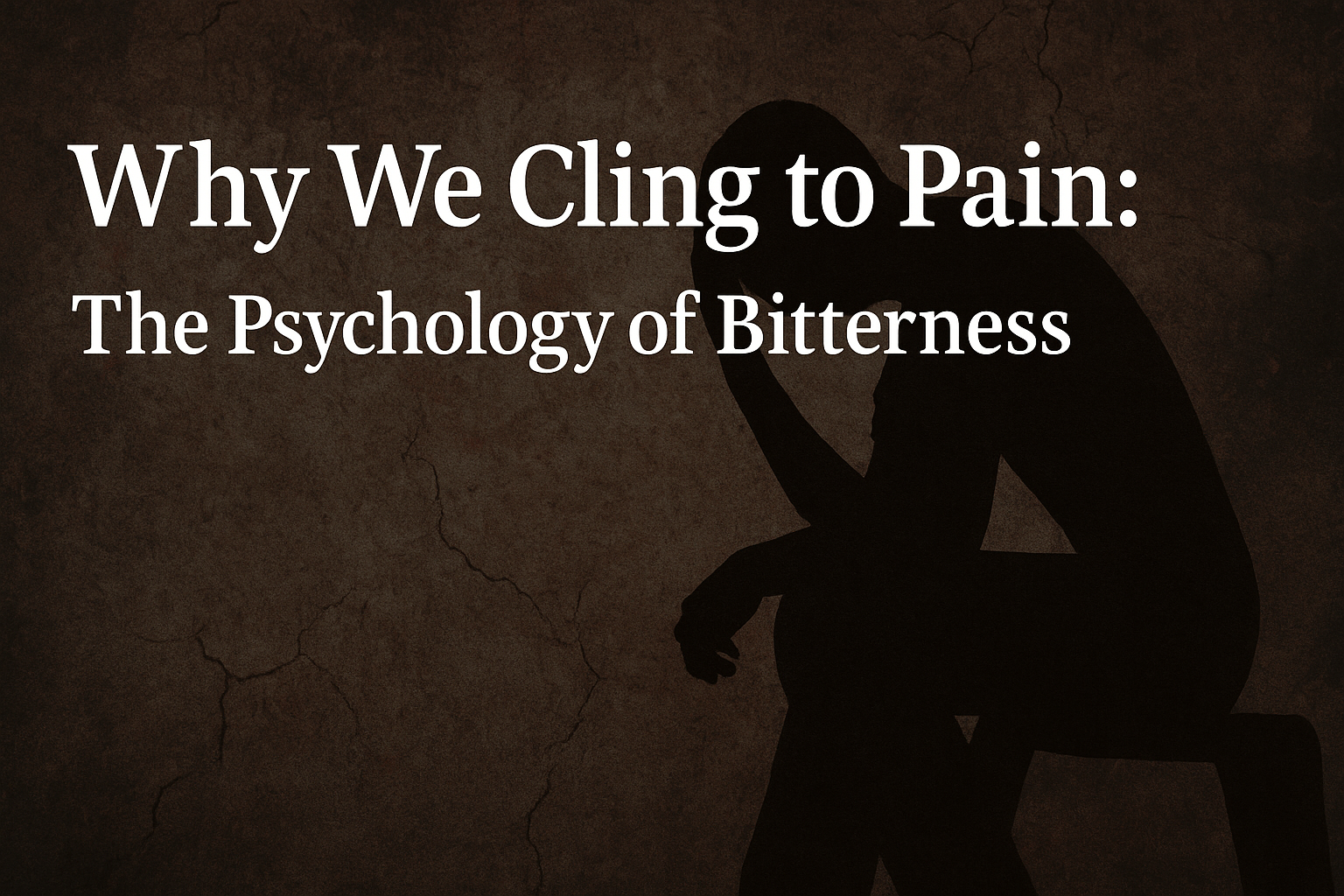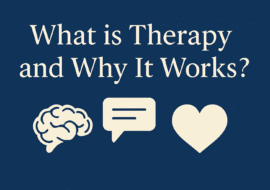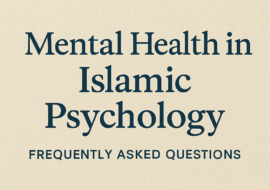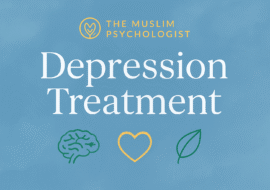
Why We Cling to Pain: The Psychology of Bitterness
Pain is a universal human experience. Whether physical, emotional, or existential, it touches every soul at some point. What’s even more intriguing than pain itself is the way people often hold onto it, revisit it, or even seek it out. What lies behind this strange relationship between the human soul and suffering?
Pain – A Sign of Life and a Path to Meaning
Pain is not just a signal that something is wrong; it is also a reminder that we are alive. In emotional terms, it wakes us from numbness. It calls us back to what matters. It draws attention to what is broken, missing, or misaligned within us. Pain is often the beginning of self-reflection and transformation.
In Islamic tradition, pain is not viewed as punishment by default, but as a divine opportunity for purification. One of the most profound perspectives comes from Imam Abu Hamid al-Ghazali, who writes in Ihya’ ‘Ulum al-Din:
“Suffering is a divine scalpel. Through it, Allah removes the illness from the soul just as a surgeon removes a tumor from the body. Without this pain, the soul would decay in its comfort and forget its need for God.”
“There is a medicine in hardship that the soul cannot taste in ease. And there is a nearness to Allah in brokenness that the proud heart cannot attain.”
To Al-Ghazali, pain is not an interruption of the spiritual path, but part of it. It breaks the ego, softens the heart, and turns the servant back to the Creator. When things are easy, the soul may grow arrogant or distracted. But when it suffers, it often becomes more sincere.
Ibn Sina adds:
“Pain is a messenger. Do not dismiss it before you hear its message.”
Bitterness – When Pain Calcifies
Bitterness arises when pain remains unprocessed, unspoken, or unhealed. It is pain that has turned inward, hardened, and taken root. A bitter person is no longer actively grieving — they have become the grief itself.
Why do people remain in bitterness?
- Because bitterness gives them a sense of identity: “I am the one who was wronged.”
- Because it frees them from having to act: “As long as I hurt, I don’t have to forgive.”
- Because the pain, though corrosive, is familiar — and what’s familiar feels safer than the unknown.
But over time, bitterness closes the heart, distorts perception, and blocks healing. It replaces reflection with rumination and growth with stagnation.
Why Do People Cling to Pain?
It may seem irrational to revisit pain again and again — to replay the betrayal, rehearse the loss, or nurse the old wound. But psychologically, there are reasons:
- Control: Replaying the pain can make it feel more manageable, less chaotic.
- Habit: Emotional patterns become neurological pathways — the mind gets “used to” the ache.
- Punishment: Some people believe they deserve the pain — a form of self-inflicted justice.
- Fear of freedom: If I let go of this pain, who am I without it?
In truth, clinging to pain often hides a deeper fear of healing — because healing means change, and change is frightening.
Healing Doesn’t Mean Forgetting — It Means Integrating
True healing doesn’t mean pretending the pain never happened. Nor does it mean erasing grief. It means facing it fully, understanding its role, and allowing it to become part of your story — not the whole story.
What does it mean to “integrate” pain?
To integrate pain means to:
- Acknowledge it honestly, without denying or minimizing it.
- Understand its origin and impact on your beliefs, emotions, and behaviors.
- Give it a place in your story, not as the whole story, but as a meaningful part of your journey.
- Let it transform you, rather than trap you.
Integration is not about “getting over it” or forgetting. It’s about absorbing the lesson, allowing pain to shape your character, deepen your empathy, and inform your future choices — without letting it define your identity or control your actions.
Psychological perspective: moving from trauma to growth
In trauma therapy, integration is a key goal. When pain is not integrated, it gets “frozen” in the nervous system — this is why people have flashbacks, triggers, or patterns they can’t explain. Through reflection, therapy, and support, the person learns to connect the pain with meaning, often leading to what psychology calls post-traumatic growth.
Post-traumatic growth includes:
- A deeper appreciation for life
- More authentic relationships
- Spiritual awakening or return to faith
- New purpose or direction
- Stronger inner resilience
Islamic perspective: pain as purification and elevation
In Islam, pain is not meant to be suppressed or hidden — but rather faced with sabr, expressed in du‘a, and understood through tawakkul. Pain becomes integrated when:
- We accept it as part of qadar (divine decree)
- We allow it to soften our hearts and reconnect us to Allah
- We use it to cleanse the ego, forgive others, and humble ourselves
“The broken heart is the doorway to Allah. Do not run from it; sit with it, and He will sit with you.”
– Imam al-Ghazali
Signs that pain has been integrated
- You can talk about it without falling apart.
- You no longer blame yourself or others endlessly.
- You don’t seek revenge, but seek wisdom.
- You use what you’ve learned to help or uplift others.
- You no longer fear the memory — it becomes a part of your strength.
“No fatigue, nor disease, nor sorrow, nor sadness, nor hurt, nor distress befalls a Muslim, even if it were the prick he receives from a thorn, but that Allah expiates some of his sins for it.”
(Bukhari & Muslim)
Patience (ṣabr) is not passive. It is active trust — holding the pain while still turning toward Allah, seeking Him, and believing that healing is possible.
In short: pain becomes integrated when it no longer controls you, but shapes you. It no longer hijacks your reactions, relationships, or inner peace. It becomes part of your story — a meaningful chapter, not the whole book.
Seeking Help Is Strength, Not Weakness
There are moments when reflection, prayer, and patience are not enough on their own — when the weight of pain becomes too heavy to carry alone. In such times, seeking professional help is not a failure of faith, but a form of wisdom, self-respect, and trust in Allah’s mercy through the means He provides.
“O servants of Allah, seek treatment. For indeed, Allah has not sent down any disease except that He also sent down its cure.”
(Sahih Muslim)
Just as we go to a doctor for an illness of the body, we can — and should — turn to a psychologist, counselor, or therapist for the struggles of the heart and mind. It is not a lack of imān (faith), but a commitment to healing with tawakkul (trust in Allah) and effort.
You don’t have to carry your pain alone.
You are allowed to ask for support.
And you are worthy of healing — in both this world and the next.
You might also like: Am I The Only One Struggling With Mental Health Issues?
If you feel that this article resonated with you or offered some comfort, and you’re seeking guidance or support on your journey, I’d be honored to walk alongside you.
📍 The Muslim Psychologist – Mental Health Services
🧠 Diana Asandei, Licensed Clinical Psychologist, M.A. in Clinical Psychology and Psychotherapy
📧 themuslimpsychologist09@gmail.com
🌍 Online sessions available in English or Romanian.
You don’t have to do this alone—reach out when you’re ready. I’m here for you.




